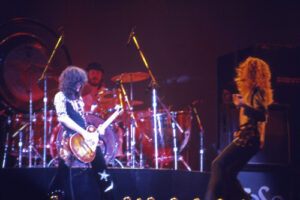
Feature Photo Credit: Photo by Jon Chase/Harvard Staff Photographer
Robin Batteau is a rare figure in American music—an artist whose achievements span genres, decades, and media. His mantle holds a Grammy, an Emmy, a Clio, and an Oscar nomination, recognizing his songwriting, producing, and unique skill as an improvisational violinist. Batteau’s journey began in Harvard’s halls as a biochemistry major, but just six months after initially enrolling, he was signed to his first record deal with Columbia Records, launching a multifaceted career that would see him record more than a dozen albums, perform with some of the most iconic musicians of the past fifty years, and pen songs for superstars in pop, folk, and even Hollywood.
After his early start, Batteau never stopped evolving. His violin has intertwined with the music of legends such as Yo-Yo Ma, Benny Goodman, and Bruce Springsteen. His songwriting has attracted interpretations from artists as diverse as Whitney Houston, Judy Collins, Aretha Franklin, and Paul Newman. With David Buskin, he formed the acclaimed duo Buskin & Batteau, recording a string of albums and touring extensively before their amicable split in 2014.
In the world of advertising, Batteau’s influence is just as deep. His melodies have underscored some of the most successful and recognizable campaigns of the last several decades: “I’m Lovin’ It” for McDonald’s, “This is Beer” for Budweiser, “Can’t Beat It” for Coca-Cola, and “The Heartbeat of America” for Chevrolet. These jingles have garnered nearly 1,000 industry awards, and his work in this sphere is cited as among the most impactful in modern commercial music.
His creative output isn’t limited to entertainment—Robin has written music to champion causes such as World Hunger Year, Save the Whales, and Paul Newman’s Hole in the Wall Gang Camp for children with serious illnesses. His songs have supported initiatives ranging from Bill Clinton’s 1992 presidential campaign to ocean conservation with Ocean Alliance.
Despite a life crowded with artistic achievement, Batteau’s academic path remained unfinished until recently. During the COVID-19 pandemic, he returned to Harvard to complete the degree he began in the 1960s, setting a world record for the longest gap between starting and finishing an undergraduate degree—over fifty years, from 1970 to 2022.
Batteau’s latest project, Banned in Sparta, is perhaps his most ambitious and personal to date. Inspired by an Ancient Greek History class he took during his return to Harvard, Batteau was moved by the lyric poets of the classical era—singer-songwriters who performed live with the lyre and whose verses shaped culture centuries before the written word was dominant. The album, released July 11, is a collaborative celebration of these ancient voices, with poems adapted into songs performed by an impressive roster: Tom Paxton, Eric Andersen, Carolyn Hester, Livingston and Kate Taylor, Matt Nakoa, Robin Lane, two-time Tony winner James Naughton, and Batteau’s gifted children Keira and Greg.
Banned in Sparta draws deeply from the work of poets active between 700 and 400 BC, with one Roman outlier—Gaius Valerius Catullus—whose passionate poetry is performed here by Eric Andersen. The album’s title references Archilochus, a warrior-poet so irreverent that he was “banned in Sparta,” his rebellious spirit captured in the song “Archilochus Re-Deemed,” sung by James Naughton. Kate Taylor offers a powerful rendition of “Telesilla’s On the Wall,” telling the story of a woman poet and wartime leader. The album is rich with female perspectives: Corrina’s “In Her Loving Arms” (sung by Carolyn Hester), Praxilla’s “The Most Beautiful Thing in the World” (Keira Naughton), and Sappho’s inspiration for “Terra Cotta Heart” (Robin Lane), alongside Livingston Taylor’s “My Sappho, Sweetly Smiling,” which channels the lovesick poet Alcaeus.
Batteau’s imaginative approach involved “mosaic-ing” together the fragments that remain of these ancient poets, aiming to preserve both their voices and their emotions for a modern audience. As he puts it, these lyric poets were the “stars of their day,” singing, playing, and dancing in live performance—much like today’s singer-songwriters.
The musical textures of Banned in Sparta are as varied as its subjects, with contributions ranging from Tom Paxton’s lively “Shake your Hair (You Thracian Filly)” to Matt Nakoa’s piano-driven “Theatre of Memory (Man of Gold).” Throughout, Batteau’s arrangements bridge past and present, ensuring these ancient words ring out with new relevance and feeling.
The reach of Robin Batteau’s music is reflected in the praise he’s received from outlets like The Boston Globe (“Acoustic Heaven”), Time Magazine, People, The New York Times, The Washington Post, Entertainment Tonight, Oprah Winfrey, and Bonnie Raitt. His enduring influence as a performer, composer, collaborator, and innovator places him among the most original voices in American music.
As Robin Batteau releases Banned in Sparta, he continues a lifetime of weaving together tradition and invention—always pushing music into fresh territory, and always inviting new voices into the story.
Full Video Interview Below
Robin Batteau Website link below
Check out similar articles on ClassicRockHistory.com Just click on any of the links below……
Read More: Artists’ Interviews Directory At ClassicRockHistory.com
Read More: Classic Rock Bands List And Directory


































